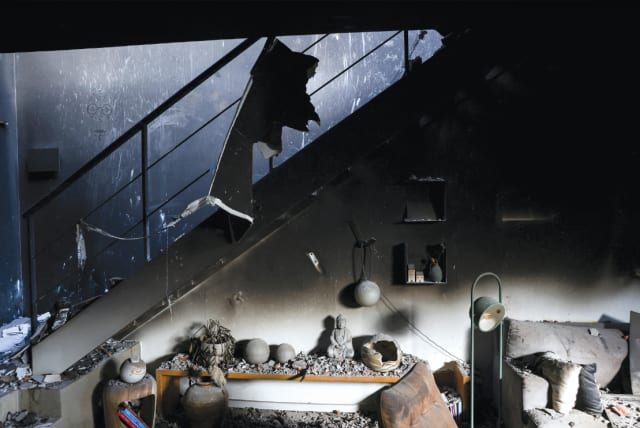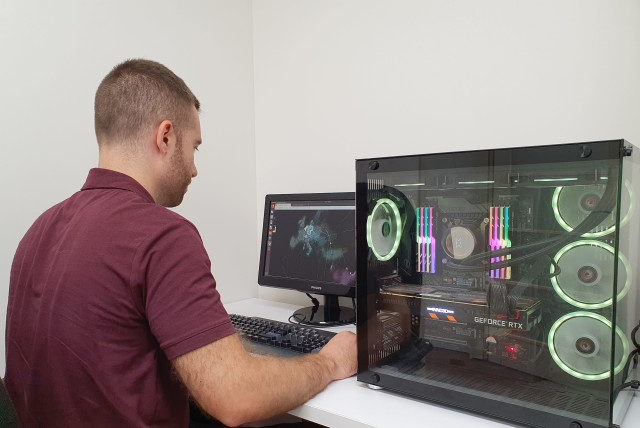Under siege: How a Jerusalem market reflects Israel's resolve in the face of terror

As a citizen, standing there in an almost empty Mahaneh Yehuda, I wondered how to offer hope after all the suffering, mourning those who were killed.
The sun was shining as I stood in Mahaneh Yehuda, the famous outdoor market of Jerusalem. I was not sure what day of the war it was. I was still seething with anger, recalling that morning of October 7, 2023, already an eternity ago. I watched the powerful images shown on Israel television as Hamas tractors easily knocked down the border fences and more than 1,000 terrorists just walked into Israel. Then they began their slaughter of more than 1,400 Israelis.
Standing in the market, not even trying to find a place to sit, I felt moved to think about some of the messages of encouragement that I received, prayers that I was safe. The power of those messages compelled me to think seriously about the future of my chosen home, where I and my family had moved 46 years ago.
Even with so many Israelis killed, wounded and kidnapped, I still believed in what Ernest Hemingway wrote over a century ago. His words have carried me through the pain I witnessed in others. “The world breaks everyone,” he wrote, “and afterward, many are strong in the broken places.”
Truth to tell, we the Jewish people have lived by that watchword throughout the centuries. We will do it again, but there are important pragmatic lessons we can already learn from this terrible massacre.
I don’t know what the answer is; I only ask the question. In awe, I have listened to survivors saying that they could actually hear and feel the anger of the terrorist when it took him a little longer to try to break into their home on a kibbutz but not succeeding.
Owning a gun
Although I have been against the possession of personal weaponry in the US, where I was born, and here in Israel, I have changed my mind. It was natural, 30 years ago, when each one of our three children, including our daughter, came home carrying a rifle. I was proud that they were guarding our country and could protect my wife and me if a terrorist broke into our house.
My opinion about guns has changed because of the terrorists’ sheer brutality. If people live in a dangerous area, they should definitely be able to own a gun if they want to or have one accessible.
In kibbutzim and moshavim, guns are available but are kept in a locked closet. When the October 7 attack began, the closets were quickly opened, and men and women took their rifles or pistols. The terrorists had RPGs and other large weapons. What a disadvantage our sisters and brothers had – they were mowed down. One young man on Kibbutz Nahal Oz managed to save himself and his family when a dozen Hamas terrorists infiltrated into his home by killing them with his handgun.
As I looked at the growing number of individuals with weapons, I still realize that the only ones carrying guns all the time are military personnel, police, and other civilian security forces.
Sadly, because there are so many people who hate us where we live here in Israel, all those who want to should have guns.
I believe that a portion of our fellow Israelis who were killed could have saved themselves and their families with personal weapons.
The hostages are a much more sensitive problem which only our government can solve. We hope that other countries will put pressure on Hamas so that the over 220 captives can be returned safely to their families.
Rabbi Sidney Greenberg, after participating in the funeral of a noted citizen, wrote: “In Hebrew, the word shahor means ‘black.’ With the slightest change of vowels, those Hebrew letters spell shahar, which means ‘dawn.’ When we are engulfed by the black night of despair, it is worth remembering that we do not give up if we cling to the precious thread of life, the blackness will be conquered by the dawn when the sun will be aflame in the east, bright with all sorts of unsuspected possibilities.”
As a citizen, standing there in an almost empty Mahaneh Yehuda, I wondered how to offer hope after all the suffering, mourning those who were killed. “David,” I told myself, “get out of this reverie. Volunteer to pack boxes, collect funds needed to buy food and equipment for soldiers, go and knock on people’s doors, find homes where children are and play games with them. Most of all, be steady on your feet, keep your eyes focused. Mostly, do not give up.”
There must always be hope to defuse this terrible tragedy, and each one of us has to do what we can to shine light in the current darkness.
Ultimately, we must remember, as then-prime minister Golda Meir told then-senator Joe Biden just before the Yom Kippur War in 1973, “We Israelis have a secret weapon – we have nowhere else to go.” ■
The writer is a retired rabbi living in Jerusalem.
Jerusalem Post Store
`; document.getElementById("linkPremium").innerHTML = cont; var divWithLink = document.getElementById("premium-link"); if (divWithLink !== null && divWithLink !== 'undefined') { divWithLink.style.border = "solid 1px #cb0f3e"; divWithLink.style.textAlign = "center"; divWithLink.style.marginBottom = "15px"; divWithLink.style.marginTop = "15px"; divWithLink.style.width = "100%"; divWithLink.style.backgroundColor = "#122952"; divWithLink.style.color = "#ffffff"; divWithLink.style.lineHeight = "1.5"; } } (function (v, i) { });

